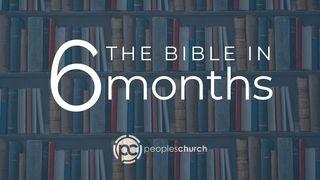The Good Mess: Finding Beauty in Imperfect MomentsSample

In the Weeds
By Debbie Morris
He was despised and rejected—a man of sorrows, acquainted with deepest grief.
We turned our backs on him and looked the other way. He was despised, and we did not care. –Isaiah 53:3 (NLT)
Six weeks after my dad was killed in a horrible tractor accident, we held our annual women’s conference at Gateway Church. Immediately after coming home from his memorial service, I had a conference to plan and execute. I didn’t have a huge team helping me at that time. In fact, it was just me and one other person—and putting on this conference required a lot from us.
Turns out, all that planning gave me something to focus on while I also grieved the death of my dad. My hands might have been busy, but my mind and heart were processing. After the conference ended, I continued to mourn, but in an unexpected way. I’ve learned that grief can sometimes look different for each person.
While I’m not the poster child for grieving well, I have endured different kinds of losses and can share my experiences. For me, when I’m processing or grieving a loss, I go into work mode. I busy myself picking weeds and planting flowers. I clean out closets. I organize the garage. Normally I’m not inclined to clean and organize daily, but when I’m grieving, working helps me feel better.
Before I understood this, Robert would encourage me to stop working and rest. I would quickly respond with, “I can’t! The flowerbeds have weeds!” and then go outside to tend my garden. Now, Robert and the kids have recognized my pattern. My hands need to do something mundane while my mind and heart process. I work, work, work, praying all the while until I find peace. Elaine says when she sees me really busy around the house and mumbling, she knows I’m working through something with the Lord and to give me space.
Unfortunately, grief is inevitable in life. Many of you reading right now are working through a loss—whether it’s a job, your health, a relationship, a marriage, a dream, or the death of a loved one. I may not understand the depth of your loss or how you should handle it, but I know Someone who does.
Isaiah 53:3 foretells that Jesus would be “a Man of sorrows, acquainted with grief.” And He was. Jesus dwelled among us as a human for thirty-three years, and He encountered death, loss, disappointment, and grief just like us. Scholars say Jesus’ earthly father, Joseph, died during Jesus’ teens or twenties. Jesus no doubt mourned with His mother and siblings. When Jesus’ friend Lazarus died, He was moved with deep compassion for Mary and Martha and wept. Hebrews 4:14–16 says that Jesus, our High Priest, understands us because He faced what we face. If you are sad today, Jesus understands. The Bible says God “care[s] about the anguish of [our] soul” (Psalm 31:7 NLT) and that He promises to be “close to the brokenhearted” (Psalm 34:18 NLT).
Grieving for you may mean scheduling a daily time to cry or talk to a counselor or pastor. Know this: Jesus does not leave you alone in your grief. He sits with you and offers you real hope for your future. Someday, “He will wipe every tear from their eyes, and there will be no more death or sorrow or crying or pain. All these things are gone forever” (Revelation 21:4 NLT). Until that day comes, while I’m pulling weeds, Jesus is right there with me, gloves in hand.
Finding Beauty in the Mess
Ask the Lord to speak to you about your grief and how to walk through this season. Don’t be afraid or ashamed to talk to a counselor or pastor if you need to as well.
About this Plan

Beauty can be found in life’s imperfect moments. In this plan consisting of excerpts from the new devotional The Good Mess, mother-daughter duo Debbie Morris and Elaine Fisher share six of thirty-six stories that all women can relate to. Find out how God can rewrite our messes into stories that bring Him glory!
More
Related plans

The 3 Wise Women of Christmas

Christian Friendship First: Why It’s Worth the Wait Before Dating

Strengthen Your Faith #4 a New Life

Finding God’s Love in Our Wounds

Embracing the Virtue: A Journey to Becoming a Proverbs 31 Wife

3 Steps to Being a KINGDOM BUILDER in Your Life Today - Part 3

The Bible in 6 Months

IHCC Daily Bible Reading Plan - December

BibleProject | the Lord's Prayer
